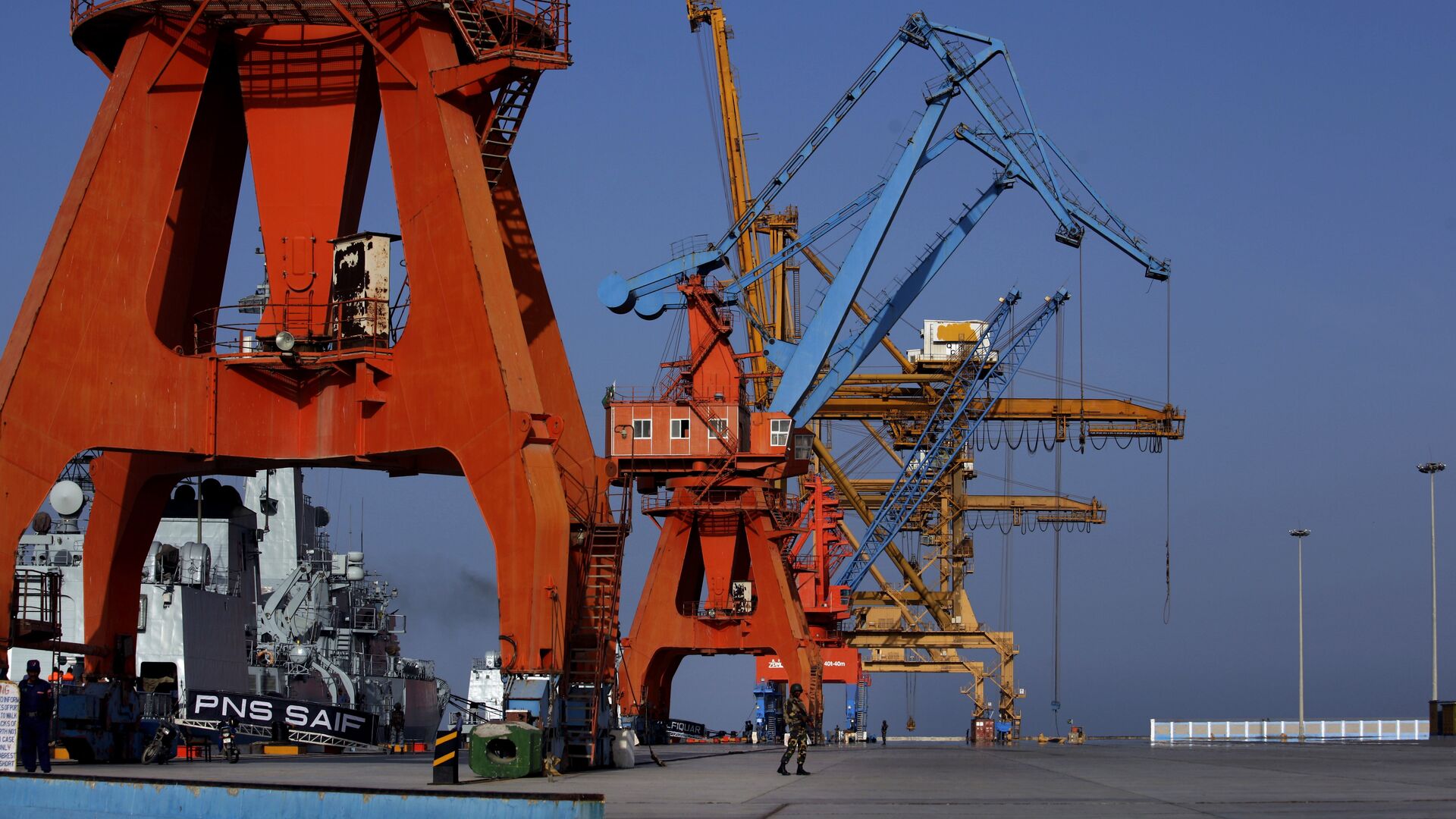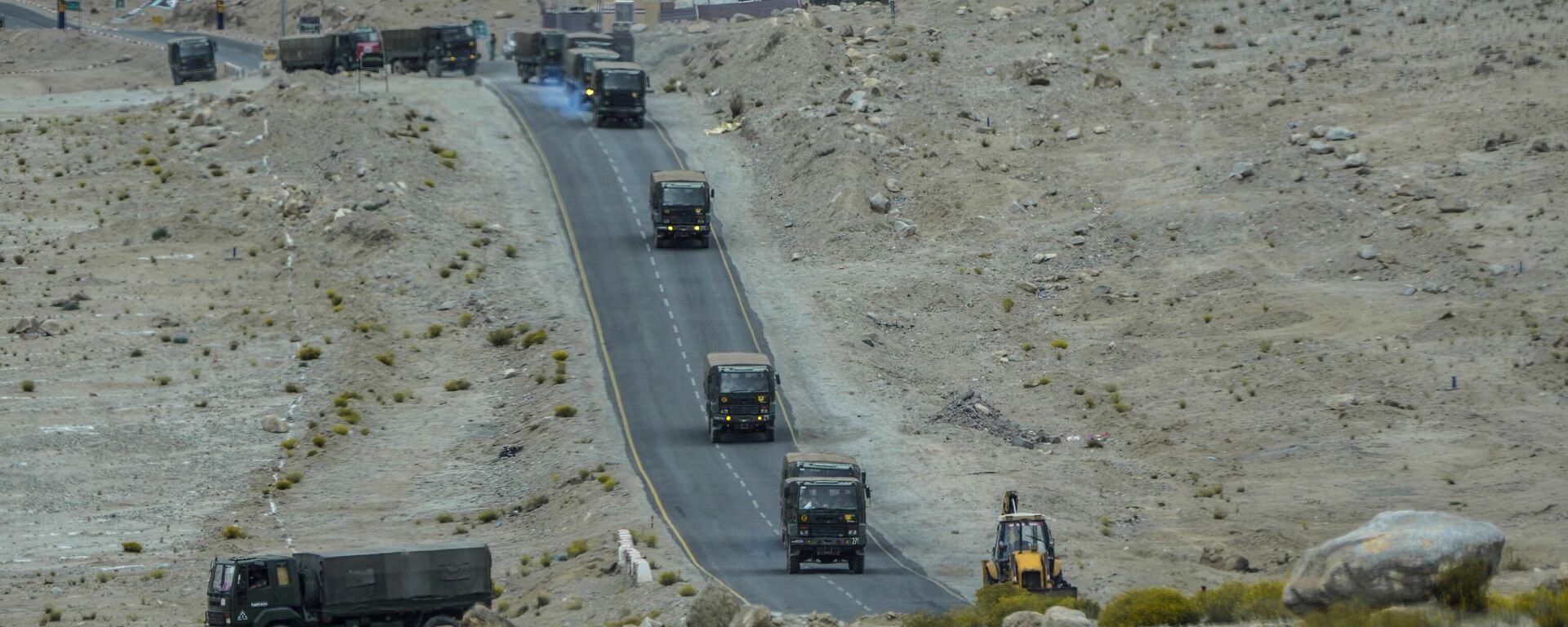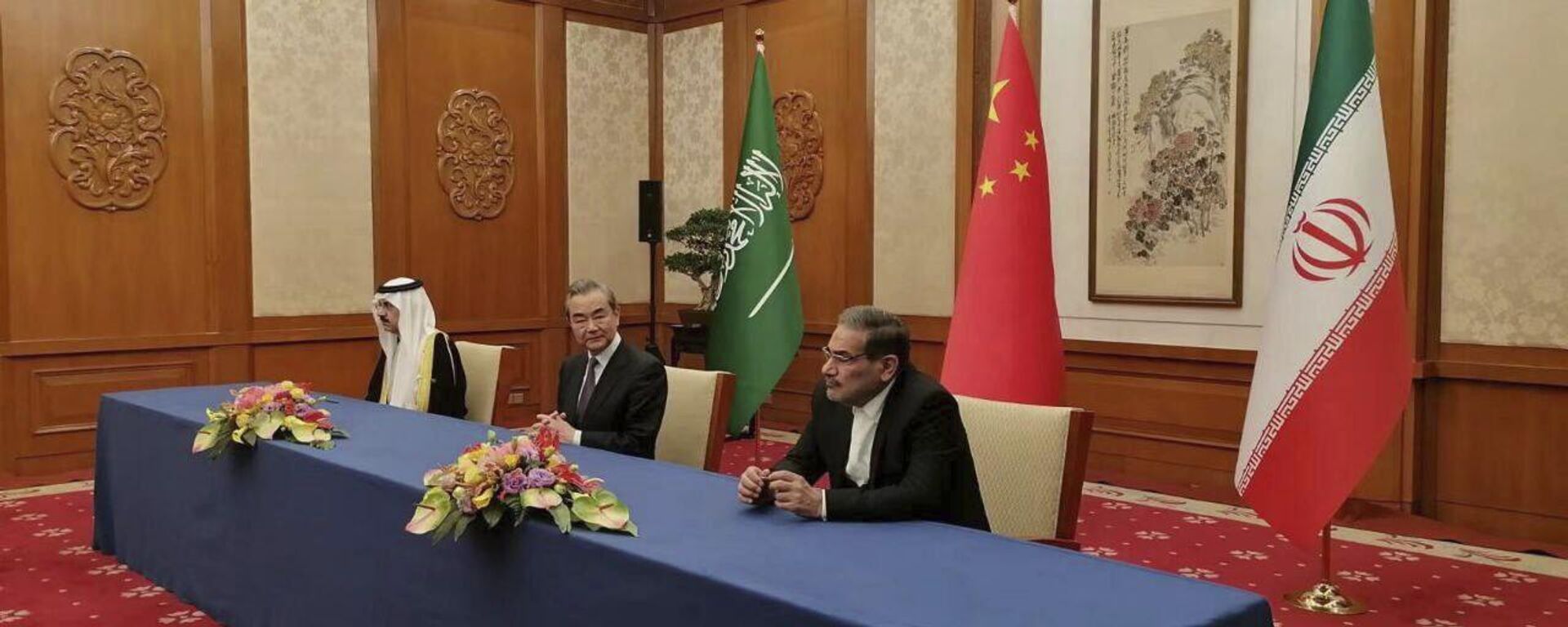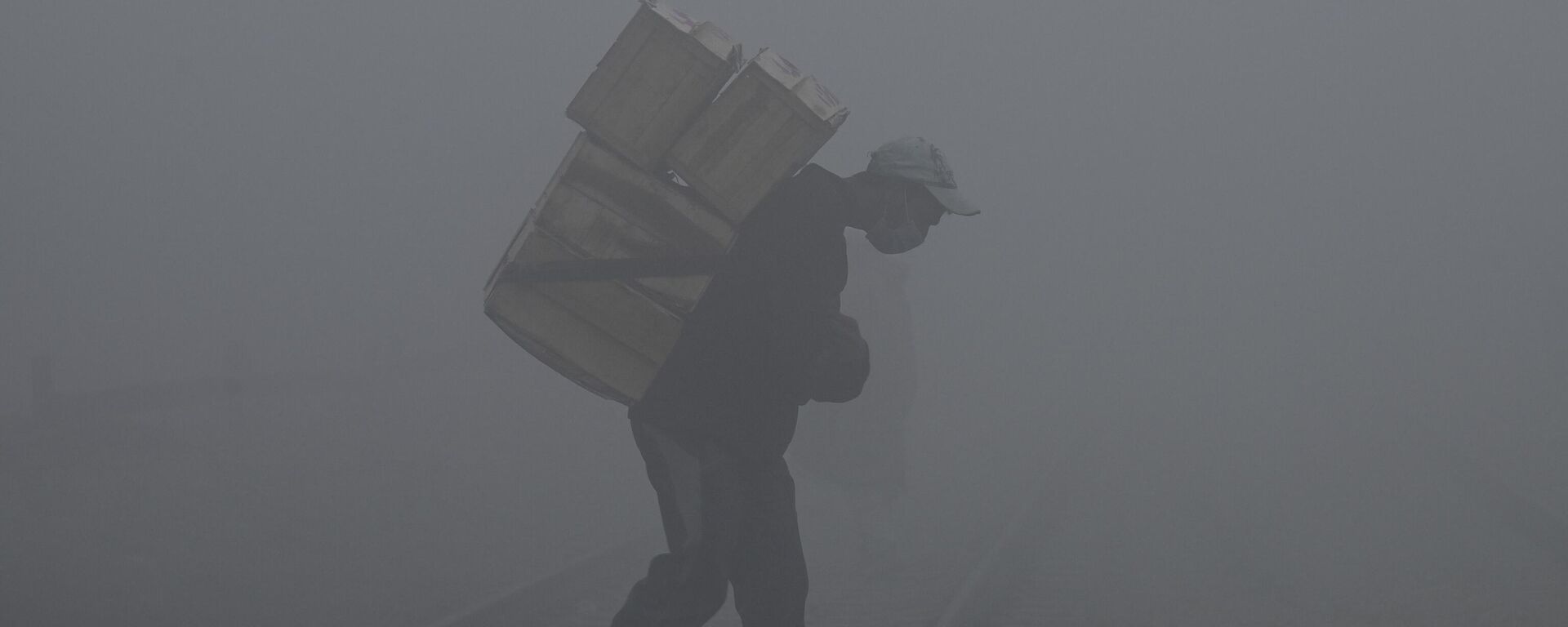https://sputniknews.in/20230322/power-project-with-iran-aims-to-keep-gwadar-port-functioning-amid-economic-crisis-in-pakistan-1260131.html
Power Project With Iran Aims to Keep Gwadar Port Functioning Amid Economic Crisis in Pakistan
Power Project With Iran Aims to Keep Gwadar Port Functioning Amid Economic Crisis in Pakistan
Sputnik India
Recently Pakistan signed a memorandum of understanding (MoU) with Iran to supply 100 megawatts of electricity to Pakistan's port of Gwadar. Beside the import... 22.03.2023, Sputnik India
2023-03-22T16:27+0530
2023-03-22T16:27+0530
2023-03-22T16:33+0530
world news
iran
pakistan
thermal power plant (tpp)
power outage
trade corridor
coal production
economic crisis
https://cdn1.img.sputniknews.in/img/07e7/03/16/1261528_0:157:4938:2935_1920x0_80_0_0_c74eee0502fdc2d94eb41fdd90e1ccd3.jpg
Located in the southern province of Balochistan, Gwadar Port is situated on the shores of the Arabian Sea in the city of Gwadar. The port is located some 500 km from Pakistan's largest city, Karachi, and is approximately 120 km from the Iranian border.With a 600-kilometer coastline, Gwadar is an important deep-sea port for Pakistan currently operated by China. The port has direct access to the Indian Ocean under the $64 billion China-Pakistan Economic Corridor (CPEC) project. Hence, development of Gwadar Port has immense implications for all the countries of the region.Currently the area is isolated from the National Grid of Pakistan because huge investment and lengthy construction time is required for its connection to the National Grid.During the series of recent meetings, both Iranian and Pakistani ministers stressed boosting cooperation in the development of Gwadar and showed an interest in initiating new joint ventures in the field of energy.The agreement for the supply of 100 megawatts of electricity to Gwadar was signed between Pakistan's Energy Minister, Khurram Dastgir Khan, and his Iranian counterpart. This project is believed to ensure an uninterrupted power supply to Gwadar Port, which at present suffers from prolonged power outages.Khan had initiated the project during his earlier visit in June 2022 and in record time, just nine months, an electricity transmission line was laid from Iran to Gwadar.However at present the exact timing for power supply and tariff issues are still under discussion and are set to be finalized after an agreement with the federal cabinet. But the energy ministry wants the project to be inaugurated at the earliest to ensure an uninterrupted power supply to Gwadar.This import of additional power from Iran will be beneficial for the people of Gwadar and neighboring Makran division in terms of power adequacy and reductions in load-shedding. It will potentially increase the confidence of the key business players and investors to tap the opportunities provided by the Gwadar region for their potential businesses.During his recent visit to Tehran, the minister also attended a ceremony dedicated to the upcoming Pakistan Day and said Pakistan and Iran were two fraternal nations with strong bonds of common faith, cultural affinity and shared history.Making of a Port CityThe new scheme with Iran is projected to be sufficient to meet the present electrical needs of the Gwadar region, and any further demand that arises with future development could be met with alternatives.Nevertheless, in order to make Gwadar the successful trading hub that it can potentially be, the supply of Iranian electricity caters to only a small fraction of the overall requirement.In order to achieve the top level of industrialization the port still needs a lot of development and for that reason Pakistan has been importing coal, as the region's thermal power plants need it.Last year, however, the imported coal-fired generation fell to a five-year low as expensive seaborne coal prices slowed down imports and the country's switch to domestic coal generation intensified.The future of the 300MW Gwadar coal power plant project, which was due to run on imported coal, remains unclear.Just last week there were some reports suggesting that Pakistan is in talks with China to revive the Gwadar coal power plant, but Pakistan’s ongoing foreign exchange crisis has negatively impacted the ability of coal power plants to procure fuel from their coal suppliers.Imported coal for power generation in Pakistan is typically sourced from South Africa and Afghanistan. As the imports fell, domestic coal-based generation was somewhat increased by the launch of two new plants in 2022, adding to the 660MW Engro PowerGen Thar plant. The two new plants are called Lucky Electric Power (660MW) by Thar Energy and ThalNova (330MW) by Hubco.However, the revival of the Gwadar power project based on imported coal could worsen Pakistan’s current economic stress. Just recently, Port Qasim Electric Power Company (Pvt.) Limited had to shut down their 660 MW units due to the plant’s inability to pay back its coal supplier. Hence, it could be alarming to bring on another imported coal power plant under a similar state when the existing ones are having trouble continuing operations.The Gwadar coal power plant was first conceived in 2016, at an estimated cost of $542 million. The plant is to be constructed by the Chinese company, CIHC Pak Power, a subsidiary of the state-owned China Communications and Construction Group.Earlier it was reported that the power plant had allegedly secured financing from the Industrial and Commercial Bank of China (ICBC), China’s largest commercial bank. Once completed, it will supply power, on a priority basis, to the industries being set up at the Gwadar Free Zone (GFZ), a special economic zone at Gwadar port that forms part of the China-Pakistan Economic Corridor (CPEC).
https://sputniknews.in/20230106/pakistan-assures-china-economic-projects-secure-despite-terror-attacks-402456.html
https://sputniknews.in/20230318/islamabad-played-role-in-facilitating-saudi-iran-deal-pakistan-foreign-ministry-1217282.html
https://sputniknews.in/20230313/pakistan-formulates-first-clean-air-policy-to-fight-pollution-1147965.html
iran
pakistan
Sputnik India
feedback.hindi@sputniknews.com
+74956456601
MIA „Rossiya Segodnya“
2023
Aneela Rashid
https://cdn1.img.sputniknews.in/img/07e6/0c/0d/74548_0:0:485:484_100x100_80_0_0_821526e967ae85d041e2d30ee34fa1de.jpg
Aneela Rashid
https://cdn1.img.sputniknews.in/img/07e6/0c/0d/74548_0:0:485:484_100x100_80_0_0_821526e967ae85d041e2d30ee34fa1de.jpg
News
en_IN
Sputnik India
feedback.hindi@sputniknews.com
+74956456601
MIA „Rossiya Segodnya“
Sputnik India
feedback.hindi@sputniknews.com
+74956456601
MIA „Rossiya Segodnya“
Aneela Rashid
https://cdn1.img.sputniknews.in/img/07e6/0c/0d/74548_0:0:485:484_100x100_80_0_0_821526e967ae85d041e2d30ee34fa1de.jpg
iran, pakistan, thermal power plant (tpp), power outage, trade corridor, coal production, economic crisis
iran, pakistan, thermal power plant (tpp), power outage, trade corridor, coal production, economic crisis
Power Project With Iran Aims to Keep Gwadar Port Functioning Amid Economic Crisis in Pakistan
16:27 22.03.2023 (Updated: 16:33 22.03.2023) Recently Pakistan signed a memorandum of understanding (MoU) with Iran to supply 100 megawatts of electricity to Pakistan's port of Gwadar. Beside the import of electricity from Iran, the government is also working on the 300MW Gwadar Coal Power Project to meet future increased demand in the port city.
Located in the southern province of Balochistan, Gwadar Port is situated on the shores of the Arabian Sea in the city of Gwadar. The port is located some 500 km from Pakistan's largest city, Karachi, and is approximately 120 km from the Iranian border.
With a 600-kilometer coastline, Gwadar is an important deep-sea port for Pakistan currently operated by China. The port has direct access to the Indian Ocean under the $64 billion China-Pakistan Economic Corridor (CPEC) project. Hence, development of Gwadar Port has immense implications for all the countries of the region.
Currently the area is isolated from the National Grid of Pakistan because huge investment and lengthy construction time is required for its connection to the National Grid.
During the series of recent meetings, both Iranian and Pakistani ministers stressed boosting cooperation in the development of Gwadar and showed an interest in initiating new joint ventures in the field of energy.
The agreement for the supply of 100 megawatts of electricity to Gwadar was signed between Pakistan's Energy Minister, Khurram Dastgir Khan, and his Iranian counterpart. This project is believed to ensure an uninterrupted power supply to Gwadar Port, which at present suffers from prolonged power outages.
Khan had initiated the project during his earlier visit in June 2022 and in record time, just nine months, an electricity transmission line was laid from Iran to Gwadar.
However at present the exact timing for power supply and tariff issues are still under discussion and are set to be finalized after an agreement with the federal cabinet. But the energy ministry wants the project to be inaugurated at the earliest to ensure an uninterrupted power supply to Gwadar.
This import of additional power from Iran will be beneficial for the people of Gwadar and neighboring Makran division in terms of power adequacy and reductions in load-shedding. It will potentially increase the confidence of the key business players and investors to tap the opportunities provided by the Gwadar region for their potential businesses.
During his recent visit to Tehran, the minister also attended a ceremony dedicated to the upcoming Pakistan Day and said Pakistan and Iran were two fraternal nations with strong bonds of common faith, cultural affinity and shared history.
The new scheme with Iran is projected to be sufficient to meet the present electrical needs of the Gwadar region, and any further demand that arises with future development could be met with alternatives.
Nevertheless, in order to make Gwadar the successful trading hub that it can potentially be, the supply of Iranian electricity caters to only a small fraction of the overall requirement.
In order to achieve the top level of industrialization the port still needs a lot of development and for that reason Pakistan has been importing coal, as the region's thermal power plants need it.
Last year, however, the imported coal-fired generation fell to a five-year low as expensive seaborne coal prices slowed down imports and the country's switch to domestic coal generation intensified.
The future of the 300MW Gwadar coal power plant project, which was due to run on imported coal, remains unclear.
Just last week there were some reports suggesting that Pakistan is in talks with China to revive the Gwadar coal power plant, but Pakistan’s ongoing foreign exchange crisis has negatively impacted the ability of coal power plants to procure fuel from their coal suppliers.
Imported coal for power generation in Pakistan is typically sourced from South Africa and Afghanistan. As the imports fell, domestic coal-based generation was somewhat increased by the launch of two new plants in 2022, adding to the 660MW Engro PowerGen Thar plant. The two new plants are called Lucky Electric Power (660MW) by Thar Energy and ThalNova (330MW) by Hubco.
However, the revival of the Gwadar power project based on imported coal could worsen Pakistan’s current economic stress. Just recently, Port Qasim Electric Power Company (Pvt.) Limited had to shut down their 660 MW units due to the plant’s inability to pay back its coal supplier. Hence, it could be alarming to bring on another imported coal power plant under a similar state when the existing ones are having trouble continuing operations.
The Gwadar coal power plant was first conceived in 2016, at an estimated cost of $542 million. The plant is to be constructed by the Chinese company, CIHC Pak Power, a subsidiary of the state-owned China Communications and Construction Group.
Earlier it was reported that the power plant had allegedly secured financing from the Industrial and Commercial Bank of China (ICBC), China’s largest commercial bank. Once completed, it will supply power, on a priority basis, to the industries being set up at the Gwadar Free Zone (GFZ), a special economic zone at Gwadar port that forms part of the China-Pakistan Economic Corridor (CPEC).





